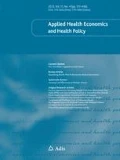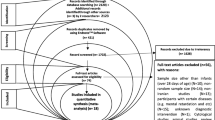Abstract
Background
Inborn errors of metabolism (IEM) are a significant cause of morbidity and mortality in North Africa and the Middle East. With the evident success of neighbouring countries in initiating neonatal screening for IEM, the Libyan Authorities are now considering introducing neonatal screening for phenylketonuria (PKU) in Libya in the first instance, with the prospect of expanding the programme to cover other IEM in the future.
Objective
To estimate the cost effectiveness of neonatal screening for PKU compared with no neonatal screening in Libya.
Methods
A decision model was constructed to estimate the cost effectiveness of neonatal screening for PKU, from the perspective of Libyan society. Healthcare resource use and other input parameters were based on expert opinion.
Results
The expected discounted cost to Libyan society of screening over 15 years and managing ~ 374 patients with detected PKU over their lifetime was estimated to be $US213.6 (95% CI 211.9, 214.3) million (year 2007–8 values). The current expected discounted cost of managing these same PKU patients over their lifetime as a result of not screening was estimated to be $US321.2 (95% CI 318.0, 322.7) million. Hence, screening would save Libyan society $US107.6 (95% CI 105.5, 109.1) million over the lifetime of PKU patients and lead to an additional 6947 life-years (95% CI 6837, 7056). The expected cost per undiscounted life-year gained was estimated to be-$US15 500 (95% CI-16 600, 1100). There would be a 90% return on investment in the screening programme since society would gain $US1.9 for every $US1 invested. Probabilistic sensitivity analysis demonstrated that the screening programme has a 0.95 probability of being cost effective even at a willingness-to-pay threshold of $US4000 per life-year gained.
Conclusions
Within the model’s limitations, neonatal screening for PKU appears to offer Libyan society a strategy that is cost effective compared with no neonatal screening.






Similar content being viewed by others
References
World Health Organization. Libyan Arab Jamahiriya. Geneva: WHO, 2008 [online]. Available from URL: http://www.who.int/countries/lby/en/ [Accessed 2009 Jun 17]
Williams RA, Mamotte CD, Burnett JR. Phenylketonuria: an inborn error of phenylalanine metabolism. Clin Biochem Rev 2008; 29(1): 31–41
Medical Research Council Working Party on Phenylketonuria. Phenylketonuria due to phenylalanine hydroxylase deficiency: an unfolding story. BMJ 1993; 306(6870): 115–9
Jurdi R, Saxena PC. The prevalence and correlates of consanguineous marriages in Yemen: similarities and contrast with other Arab countries. J Biosoc Sci 2003; 35(1): 1–13
Department of Health and Environment. Libyan family health survey, 2008. (Data on file)
Guthrie R, Whitney S. Phenylketonuria detection in the neonatal infant as a routine hospital procedure: a trial of a phenylalanine screening method in 400,000 infants. Washington, DC: US Department of Health, Education and Welfare Office, 1964
Kaufman S. A model of human phenylalanine metabolism in normal subjects and in phenylketonuric patients. Proc Natl Acad Sci U S A 1999; 96(6): 3160–4
Ordookhani A, Mirmiran P, Moharamzadeh M, et al. A high prevalence of consanguineous and severe congenital hypothyroidism in an Iranian population. J Pediatr Endocrinol Metab 2004; 17(9): 1201–9
Hashemipour M, Amini M, Talaie M, et al. Parental consanguinity among parents of neonates with congenital hypothyroidism in Isfahan. East Mediterr Health J 2007; 13(3): 567–74
Ozalp I, Coskun T, Tokol S, et al. Inherited metabolic disorders in Turkey. J Inherit Metab Dis 1990; 13(5): 732–8
Knox WE. Phenylketonuria. In: Stanbury JB, Wyngaarden JB, Fredrickson DS, editors. The metabolic basis of inherited disease. New York: McGraw-Hill, 1972
Geelhoed EA, Lewis B, Hounsome D, et al. Economic evaluation of neonatal screening for phenylketonuria and congenital hypothyroidism. J Paediatr Child Health 2005; 41(11): 575–9
Dhondt JL, Farriaux JP, Sailly JC, et al. Economic evaluation of cost-benefit ratio of neonatal screening procedure for phenylketonuria and hypothyroidism. J Inherit Metab Dis 1991; 14(4): 633–9
Carroll AE, Downs SM. Comprehensive cost-utility analysis of newborn screening strategies. Pediatrics 2006; 117(5 Pt 2): S287–95
Autti-Rämö I, Mäkelä M, Sintonen H, et al. Expanding screening for rare metabolic disease in the newborn: an analysis of costs, effect and ethical consequences for decision-making in Finland. Acta Paediatr 2005; 94(8): 1126–36
The National Society for Phenylketonuria (NSPKU). Management of PKU: a consensus document for the diagnosis and management of children, adolescents and adults with phenylketonuria. London: NSPKU, 2004 [online]. Available from URL: http://www.nspku.org/Documents/Management%20of%20PKU.pdf [Accessed 2009 Jun 17]
Sheldon TA. Discounting in health care decision-making: time for a change? J Public Health Med 1992; 14(3): 250–6
Pollitt RJ, Green A, McCabe CJ, et al. Neonatal screening for inborn errors of metabolism: cost, yield and outcome. Health Technol Assess 1997; 1(7): i–iv, 1–202
Sultan A. Summary of new tax laws (No. 7 & 8 of 2010) [online]. Available from URL: http://www.sat.ly/business.htm [Accessed 2009 Jun 17]
International Monetary Fund. Socialist People’s Libyan Arab Jamahiriya: statistical appendix. 2008 Sep 12 [online]. Available from URL: http://www.imf.org/external/pubs/cat/longres.cfm?sk=22356.0 [Accessed 2009 Jun 17]
Gu XF, Wang ZG. Screening for phenylketonuria and congenital hypothyroidism in 5.8 million neonates in China. Zhonghua Yu Fang Yi Xue Za Zhi 2004; 38(2): 99–102
Ahrens D, Güntert B, Brand A. Comparative presentation of current economic evaluation studies for phenylketonuria screening. Gesundheitswesen 1999; 61: 190–6
Luce BR, Manning WG, Siegel JE, et al. Estimating costs in cost-effectiveness analysis. In: Gold MR, Siegel JE, Russell LB, et al., editors. Cost effectiveness in health and medicine. New York: Oxford University Press, 1996: 176–213
Koopmanschap MA, Rutten FF, van Ineveld BM, et al. The friction cost method for measuring indirect costs of disease. J Health Econ 1995; 14(2): 171–89
Brouwer WBF, Koopmanschap MA, Reuten FFH. Productivity losses without absence: measurement validation and empirical evidence. Health Policy 1999; 48: 13–27
Gold MR, Siegel JE, Russell LB, et al., editors. Cost-effectiveness in health and medicine. New York: Oxford University Press, 1996
Weinstein MC, Siegel JE, Garber AM, et al. Productivity costs, time costs and health related quality of life: a response to the Erasmus group. Health Econ 1997; 6: 505–10
Bilginsoy C, Waitzman N, Leonard CO, et al. Living with phenylketonuria: perspectives of patients and their families. J Inher Metab Dis 2005; 28(5): 639–49
Golbahar J, Karamizadeh Z, Honardar Z. Selective screening of amino acid disorders in the south-west of Iran, Shiraz. J Inher Metab Dis 2002; 25(6): 519–21
al-Hosani H, Salah M, Saade D, et al. United Arab Emirates National Newborn Screening Programme: an evaluation 1998–2000. East Mediterr Health J 2003; 9(3): 324–32
Ridel KR, Leslie ND, Gilbert DL. An updated review of the long-term neurological effects of galactosemia. Pediatrc Neurol 2005; 339(3): 153–61
De Braekeleer M, Larochelle J. Genetic epidemiology of hereditary tyrosinemia in Quebec and in Saguenay-Lac-St-Jean. Am J Hum Genet 1990; 47(2): 302–7
Halvorsen S. Screening for disorders of tyrosine metabolism. In: Bickel H, Guthrie R, Hammersen G, editors. Neonatal screening for inborn errors of metabolism. New York: Springer-Verlag, 1980
Acknowledgements
The authors would like to thank the following people for their contributions:
Khadra Hospital, Tripoli: Dr H. Abedi, Neonatologist; Dr K. Honi, Neonatologist; Dr H. Sahli, Metabolic Specialist; Nurse J. Botha, Health Share.
Tripoli Children’s Hospital, Tripoli: Professor M. Dekna, General Paediatrician; Dr M. Kara, Neurologist; Dr K. El Rafifi, Metabolic Specialist; Dr Smeddah, Neonatologist.
Tripoli Medical Center, Tripoli: Professor M. Doggah, Metabolic Specialist; Professor F. Nafati, Neonatologist.
Zawia Hospital, Zawia City: Dr B. El-Jerbi, Endocrinologist; Dr D. Gremida, Metabolic Specialist; Dr M. Abuauba, Endocrinologist.
Dr A. Fatah Gabaj, Director, National Medical Research Center (NMRC), Zawia City; Mrs Hager, Manager of Tolitela Mental Health Institute, Tripoli; Dr A.W. Jaroud, Director of National Pharmaceutical and Medical Supply Company (NPMSCO), Tripoli; Mr A. Mahdi, Director of Mental Care Institutes within Tripoli area; Mr C. Bardakjian, Sales and Marketing Director, HVD Vertriebs GmbH (Perkin Elmer), Athens.
The authors would also like to thank the different Libyan-based couriers who provided relevant information pertaining to transportation of blood samples.
This study was sponsored financially by SHS International Ltd, Liverpool, UK and Nutricia Middle East & Africa, Dubai, UAE. Neither SHS International Ltd nor Nutricia had any input into the study design. Nor did they review the results or have any input into writing this manuscript. The authors have no other potential conflicts of interest that are directly relevant to the content of this article.
Author information
Authors and Affiliations
Corresponding author
Rights and permissions
About this article
Cite this article
Sladkevicius, E., Pollitt, R.J., Mgadmi, A. et al. Cost effectiveness of establishing a neonatal screening programme for phenylketonuria in Libya. Appl Health Econ Health Policy 8, 407–420 (2010). https://doi.org/10.2165/11535530-000000000-00000
Published:
Issue Date:
DOI: https://doi.org/10.2165/11535530-000000000-00000




